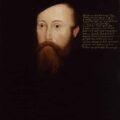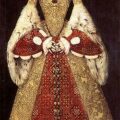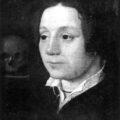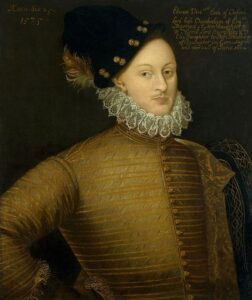
OK, I promise that this is my last post on the conspiracy theories, rumours and scandals surrounding Good Queen Bess – I will move on from this subject and give Elizabeth I a break – poor woman having all this dredged up again! But, I wanted to explore the whole Earl of Oxford/Shakespeare issue.
As I said a couple of weeks ago, American author Paul Streitz, in his book “Oxford: Son of Queen Elizabeth I”“Oxford: Son of Queen Elizabeth I”, put forward the idea that William Shakespeare was actually the illegitimate son of Elizabeth I and was raised as Edward de Vere, 17th Earl of Oxford.
But who was the father?
Well, this is where it gets interesting. Streitz names Thomas Seymour, who was married to the Dowager Queen Catherine Parr at the time, as Elizabeth’s lover and Shakespeare’s father.
As you know, I do love conspiracy theories but this one just makes me chuckle as I just can’t see any good reason to believe it, although I think it would make a wonderful novel. So, how does Paul Streitz justify this incredible allegation? Well, unfortunately, I haven’t yet managed to get hold of his book but I have read a review of it by “The Independent”, a daily newspaper from the UK and it seems that Streitz argues this theory in the following ways:-
- He rejects the “Virgin Queen” idea of Elizabeth – Streitz does not believe that Elizabeth was a virgin and is of the opinion that she actually had a few illegitimate children. He says: “The Virgin Queen was a myth created by the Tudor propaganda machine that was copied uncritically by the vast majority of historians in the following centuries.”
- Streitz believes there is evidence that Elizabeth had a relationship with Seymour – We know from evidence from contemporaries that Thomas Seymour acted inappropriately with the teenage Elizabeth, visiting her bed chamber in a state of undress, tickling her and stroking her etc. but while many historians believe that this did not turn into a full-on sexual relationship, Streitz thinks that it did.
- Streitz believes that Elizabeth’s disappearance when she should have been with her pregnant stepmother Catherine Parr is a cover for her her own pregnancy and childbirth. Although many believe that Elizabeth was ill at this time, Streitz says that there are no records of doctors seeing her at this time.
- Streitz believes the rumours of the time were true – He says: “I became suspicious that she had had a child and if you start studying the literature, there were rumours coming directly from Elizabeth that she had had a child.” Although in her letters, Elizabeth condemned the rumours about her “lewd demeanour”, Streitz says “She does not say the rumours are false; rather, she says the rumours are damaging to the king’s majesty’s sisters.”
- He argues that the following facts all point to Oxford being Elizabeth’s son: the fact that John de Vere, 16th Earl of Oxford, was forced to marry a lady close to Elizabeth’s advisers, the fact that there are no christening records for Edward de Vere, the fact that when Edward became a ward of the Crown on his father’s death that his wardship was not sold, as was common practice, and that the Queen could choose who he would marry.
- Streitz also argues that Shakespeare’s sonnets and works such as Hamlet point to Oxford/Shakespeare knowing of his true origins.
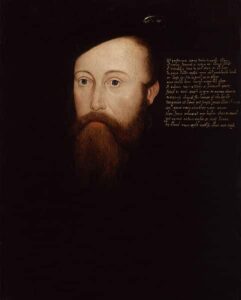
Now, Streitz does not profess to be an historian, he is an author of plays and musicals who became interested in the whole Oxford/Shakespeare theory when was researching for a play. He then went on to research Elizabeth I by reading biographies of her, which is not quite the same as browsing primary sources. So, he is not exactly a David Starkey and I must say that I take his theories with a huge pinch of salt. While his arguments are interesting and make for great fiction, I say “poppycock, poppycock” rather loudly.
I know that there were many rumours during Elizabeth’s lifetime about how she only went on her summer progresses to give birth to illegitimate children, who, according to some sources could have included Henry Wriothesley, Elizabeth Leighton, Robert Cecil, Robert Devereaux, Edward Devere, Mary Sidney and Arthur Dudley, but I cannot believe that a Queen who was forever surrounded by her ladies could have secretly given birth. I just don’t think that she could cover up a pregnancy or an illegitimate child when there were so many people waiting to knock her virgin image and threaten her throne.
Streitz’s arguments just do not add up. I actually believe that Elizabeth was a virgin, that it was a life-choice and political choice that she made and I see no reason to doubt her word. I cannot say how far things went with Thomas Seymour but I think that Catherine Parr sent Elizabeth away not to give birth in secret but to keep her from Seymour, to protect her reputation and to save Catherine’s own marriage. When Elizabeth, Kat Ashley and Thomas Parry were detained and questioned in early 1549 over Seymour’s plans to marry Elizabeth, Elizabeth denied a relationship with Seymour and denied that she was planning to marry him. I am sure that if the couple had had a full blown affair resulting in a pregnancy then this story would have come out at this time. Thomas Seymour was executed for treason but no charges were brought against Elizabeth.
Thomas Seymour – What was he doing?
I’d love to hear your thoughts on what was going through Thomas Seymour’s mind when he started acting so inappropriately with Elizabeth. He was newly married to Catherine Parr so it couldn’t have been an attempt to get Elizabeth to fall in love with him so that she would marry him. Was it pure lust?
What on earth was he up to and why did Catherine start becoming involved? To hold a teenage girl while your husband slashes her dress to bits or to watch while he tickles and strokes her seems very strange behaviour. What do you think about this situation?
Sources
- Was Shakespeare the Lover Child of Queen Elizabeth? – Review of “Oxford: Son of Queen Elizabeth I” by Paul Streitz in The Independent.
- “Elizabeth” by David Starkey
If you want to read Paul Streitz’s book, “Oxford: Son of Queen Elizabeth I”, then you can click here to buy it from Amazon.com. It has very mixed reviews on Amazon, with some people thinking that he may have a point and others feeling that the idea is preposterous and pointing out glaring mistakes that Mr Streitz has made in the book. Do let me know if you have read it and what you thought of it.
Elizabeth and Seymour in Fiction

Another book which Elizabeth Files visitor Jenny told me about is “Unicorn’s Blood” by Patricia Finney. Jenny found her copy of it and said that in her forward Finny “This is a novel, not a history book. I have used history as skeleton and scaffolding, but I have freely jumped off into fantasy whenever I felt like it, turned speculation into fact and rank conjecture into assumpton – although I have tried to keep within the boundaries of what might just be possible, given the evidence”. This is how Jenny describes the book:-
“It is set in the period when Elizabeth is being co-oerced into signing the warrant for the execution of Mary Queen of Scots – and Davison, seems to have some hold over the Queen by mentioning a “Unicorn Book” which is supposed to be recommendations to the state of Virginity.
This particular copy was supposed to belong to the young and teenaged Princes Elizabeth who, according to the plot, did become pregnant by Sir Thomas Seymour, performed her own abortion with a knitting needle and co-oerced a witch (ex -nun) to patch her up! Prior to that however, thinking that she was about to die, she wrote her last will and testament on the last pages of the book, naming the father and willing the throne (if it ever came her way) to her cousin Mary Queen of Scots!
The “witch” sees the book when Elizabeth faints and steals it hoping that it will come in handy in the future to acquire a dowry for either her grandchild or great grandchild (as it turns out to be) so as to avoid her becoming a whore. It’s a novel, very funny, very sad and very poignant in places – worth a re-read which is what I did this weekend”
